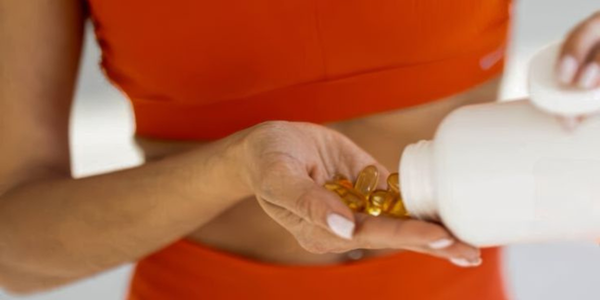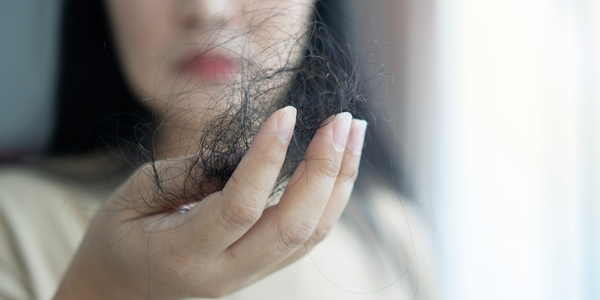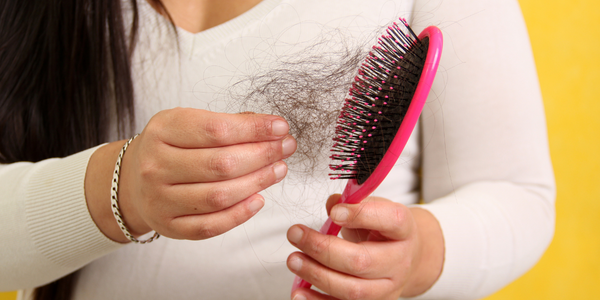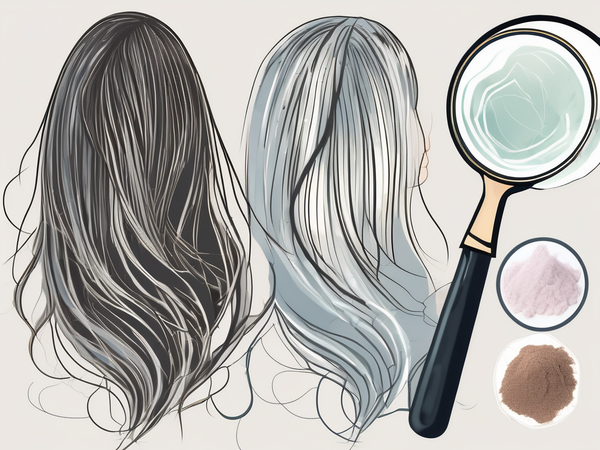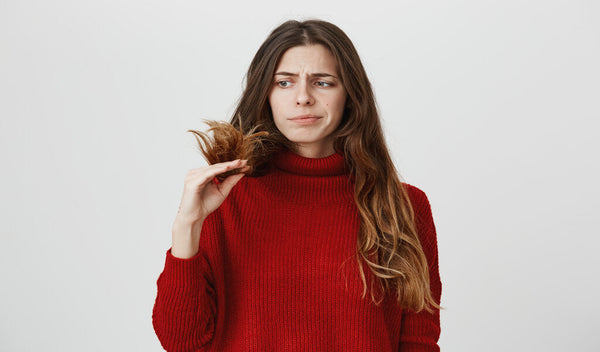Hair loss can be a distressing symptom of Polycystic Ovary Syndrome (PCOS), a condition characterized by hormonal imbalances and the formation of cysts on the ovaries. Understanding the PCOS hair loss pattern is crucial in finding effective ways to manage and reverse this condition.
Understanding PCOS and Hair Loss
What is PCOS Hair Loss?
Hair loss, also known as alopecia, is a common symptom experienced by individuals with PCOS. It is primarily caused by an excess of androgens, the male hormones, in the body. This hormonal imbalance can disrupt the natural growth cycle of hair follicles, leading to hair thinning and eventual hair loss. Moreover, the link between PCOS hair loss patterns extends beyond hormonal factors. Insulin resistance, a common characteristic of PCOS, can also contribute to hair thinning. High levels of insulin in the blood can trigger inflammation in the hair follicles, further exacerbating hair loss in individuals with PCOS.
Recognizing the Symptoms of PCOS Hair Loss
Identifying the signs of hair loss associated with PCOS is essential for early intervention. Symptoms of PCOS hair loss may include:
- Noticeable Thinning of Hair
- Receding Hairline
- Excessive Shedding
- Presence of Bald Patches
These symptoms can significantly impact an individual's self-esteem and emotional well-being. In addition to the physical manifestations of hair loss, individuals with PCOS may also experience psychological distress related to their changing appearance. The emotional toll of hair loss can lead to feelings of anxiety, depression, and social withdrawal, for which professional healthcare support is crucial.
Unraveling the Causes of PCOS Hair Loss
Polycystic Ovary Syndrome (PCOS) is a complex endocrine disorder that affects many women of reproductive age. One of the distressing symptoms associated with PCOS is hair loss, which can have a significant impact on self-esteem and quality of life.
Hormonal Imbalances and PCOS Hair Loss
PCOS and hair loss are predominantly triggered by hormonal imbalances, particularly an excess of androgens such as testosterone. These androgens can disrupt the delicate balance of hair growth and cause follicles to shrink, leading to hair thinning and eventual hair loss. In addition to androgens, imbalances in insulin and cortisol can also contribute to hair loss in women with PCOS. The interplay of these hormones can create a hostile environment for hair follicles, impeding their growth cycle and leading to increased shedding.
Genetic Factors in PCOS Hair Loss
In addition to hormonal imbalances, genetics also play a significant role in PCOS-related hair loss. Individuals with a family history of hair loss or PCOS are more prone to experiencing this symptom. Genetic predisposition can influence the sensitivity of hair follicles to androgens, making some women more susceptible to hair loss than others.
The Emotional Toll of PCOS Hair Loss
The emotional toll of PCOS-related hair loss can be significant, impacting not only one's physical appearance but also their mental and emotional well-being. The psychological effects of hair loss can manifest in various ways, such as feelings of embarrassment, self-consciousness, and a diminished sense of self-worth.
Moreover, the societal pressure to conform to certain beauty standards can exacerbate these emotional challenges for individuals experiencing PCOS hair loss. The constant comparison to mainstream ideals of beauty can further contribute to feelings of inadequacy and isolation.
Psychological Impact of Hair Loss
Hair loss can have a profound impact on an individual's emotional well-being. It can result in feelings of embarrassment, self-consciousness, and a loss of self-confidence. Coping with these emotional challenges is essential for maintaining a positive mindset and overall mental health.
Coping Mechanisms for Emotional Distress
Individuals with PCOS hair loss must explore healthy coping mechanisms to manage emotional distress effectively. This may include seeking support from trusted friends and family, engaging in activities that boost self-esteem, and seeking professional therapies such as counseling or support groups.
Strategies to Manage PCOS Hair Loss
While it can be distressing, there are effective strategies to manage PCOS-related hair loss. In addition to medical treatments and lifestyle changes, understanding the underlying causes of hair loss in PCOS can provide valuable insights into personalized care.
Lifestyle Changes to Combat PCOS Hair Loss
While medical treatments are crucial, incorporating healthy lifestyle changes can complement the management of PCOS-related hair loss.
Diet: Regular exercise not only helps in weight management, a common concern for individuals with PCOS but also aids in hormone regulation, which can positively impact hair health. A balanced diet rich in nutrients like iron, zinc, and biotin is essential for promoting hair growth and strength.
No Stress: Stress reduction techniques, such as mindfulness meditation or yoga, can help lower stress hormone levels that may contribute to hair loss.
Avoid Heat Products: Avoiding excessive heat styling tools like flat irons and blow dryers, as well as minimizing the use of harsh hair products containing sulfates and parabens, can prevent additional damage to already fragile hair. Avoid frequent hair bleaching.
Grooming Habits: Avoid combing hair when they are wet. Use soft hair bands, and satin pillowcases for bed. Avoid shampoos that contain mineral oil and wax as they lead to oil production and build-up on the scalp.
Opting for gentle hair care routines and products specifically designed for sensitive scalps can help maintain the health of the hair follicles and minimize further hair loss.
PCOS Hair Loss Treatments
When it comes to addressing PCOS-related hair loss, medical interventions are often a primary focus. Healthcare providers may recommend medications that target hormonal imbalances, such as anti-androgens or oral contraceptives.
- Metformin: To control insulin levels and help with hormonal balance.
- Multivitamin Supplements: To supplement micronutrients like biotin, choline, selenium, and zinc, essential for hair growth.
These medications can help regulate hormone levels and reduce hair loss. It is very essential to consult a healthcare professional specializing in PCOS treatment to determine the most suitable medical approach based on individual needs and health status.
The Possibility of Hair Regrowth
Understanding the Hair Growth Cycle
Hair growth follows a natural cycle that consists of three phases: the anagen (growth) phase, the catagen (transition) phase, and the telogen (resting/falling) phase. Understanding this cycle is crucial in assessing the potential for hair regrowth in individuals with PCOS hair loss.
Expanding on this, the anagen phase is the active phase where hair grows approximately 1 cm every 28 days. The length of this phase can vary depending on genetics and other factors, but it typically lasts between 2 to 7 years. The catagen phase is a short transitional phase that lasts about 10 days, during which the hair follicle shrinks and detaches from the dermal papilla. Finally, the telogen phase is the resting phase that lasts around 3 months, after which the hair falls out to make room for new hair growth.
Factors Influencing Hair Regrowth
While hair regrowth may vary among individuals with PCOS, multiple factors can influence the potential for regrowth. These factors include:
- Severity of Hair Loss
- Underlying Health Conditions
- Adherence to Treatment Plans
- Genetic Predisposition
A balanced diet rich in vitamins and minerals essential for hair health, along with stress management techniques, can support the regrowth process. Additionally, using gentle hair care products and avoiding excessive heat styling can help maintain the health of existing hair and promote new growth.
Home Remedies for PCOS Hair Loss
In addition to medical treatments and lifestyle changes, several home remedies may help manage and stimulate hair regrowth in individuals with PCOS hair loss. These remedies may include
Scalp Massages: When it comes to scalp massages, gentle circular motions can help improve blood circulation to the hair follicles, promoting hair growth.
Essential Oil Application: Massaging the scalp with essential oils like rosemary or peppermint oil may also provide additional benefits due to their known properties of stimulating hair follicles and improving hair thickness.
Nutritional Supplements: Nutritional supplements such as biotin, iron, and zinc have been shown to support hair health and growth. Including these supplements in your daily routine, either through diet or as a supplement, can aid in managing PCOS-related hair loss.
Natural Hair Masks: Additionally, natural hair masks made from ingredients like coconut oil, aloe vera, or egg whites can help nourish the scalp and strengthen hair strands, promoting overall hair health.
Patience and consistency in following suitable treatment options are key to achieving hair regrowth. Moreover, lifestyle factors such as diet, stress levels, and hair care routines can also impact hair regrowth.














